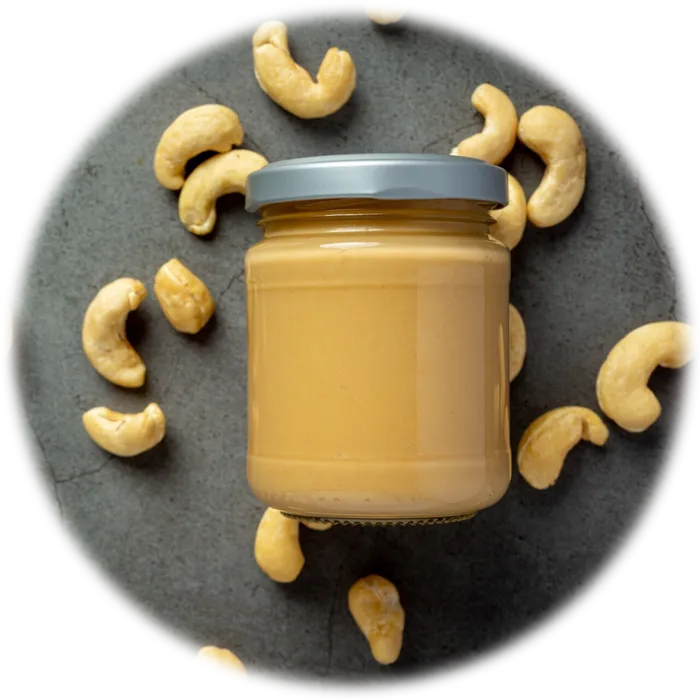
Nutritional properties of Cashew Butter
Energy :
550.00 Kcal / 100g
Category : Oils and Fats
Group : Cooking Oils & Specialty Fats
Composition And Nutritional Value :Cashew butter is made by grinding roasted or raw cashews into a creamy spread. It is composed primarily of healthy fats, including monounsaturated and polyunsaturated fats, which are beneficial for heart health. Cashew butter is also a good source of protein, fiber, and various vitamins and minerals, including magnesium, copper, and zinc. It contains antioxidants that can help protect cells from oxidative damage. With a slightly sweet and nutty flavor, cashew butter provides a rich source of energy and is relatively low in carbohydrates, making it a popular choice for those following low-carb or plant-based diets. It also offers a creamy texture that is ideal for use in both savory and sweet dishes.
Health Benefits : Cashew butter offers several health benefits due to its rich nutrient profile. The monounsaturated fats in cashew butter help reduce LDL (bad) cholesterol levels and support cardiovascular health. Magnesium and copper, two essential minerals found in cashew butter, contribute to bone health, muscle function, and energy production. The protein content in cashew butter can help promote muscle growth and repair, while its fiber content aids in digestion and helps maintain a healthy weight. Additionally, cashew butter is an excellent source of antioxidants that help combat oxidative stress and inflammation, supporting overall health and wellbeing.
Culinary Uses : Cashew butter is a versatile ingredient that can be used in both savory and sweet dishes. It can be spread on bread, crackers, or toast, or used as a dip for fruits and vegetables. In cooking and baking, cashew butter can replace dairy butter or other nut butters in recipes like cookies, smoothies, and sauces, adding a rich, creamy texture. It can also be used in salad dressings, marinades, and curries to add a nutty flavor. Cashew butter is often incorporated into vegan or plant-based recipes as a creamy, dairy-free alternative to traditional ingredients. Its subtle flavor makes it a great addition to a variety of dishes, from desserts to savory meals.
Types : Cashew butter comes in two main types: smooth and chunky. Smooth cashew butter is the most common variety, made by finely grinding cashews to create a creamy, velvety texture. Chunky cashew butter contains small pieces of cashew nuts, offering a more textured, less smooth consistency. Both types are available in natural and processed forms, with natural varieties containing only cashews and possibly a small amount of salt, while processed varieties may have added sweeteners, oils, and preservatives. There are also flavored cashew butters available, which may include ingredients like vanilla, chocolate, or honey for a unique taste experience.
Shopping And Storage Tips : When shopping for cashew butter, look for varieties that are minimally processed and contain only cashews and perhaps a bit of salt, to avoid unnecessary added sugars or oils. Check for the "natural" label to ensure that the butter retains the natural oils from the cashews. Cashew butter can be found in both jars and squeezable containers, with jarred varieties being the most common. Store cashew butter in a cool, dry place, away from sunlight and heat, to preserve its freshness. Natural cashew butter may separate over time, with the oil rising to the top, so stir it well before use. For longer shelf life, cashew butter can be refrigerated, though it will become firmer and more difficult to spread.

